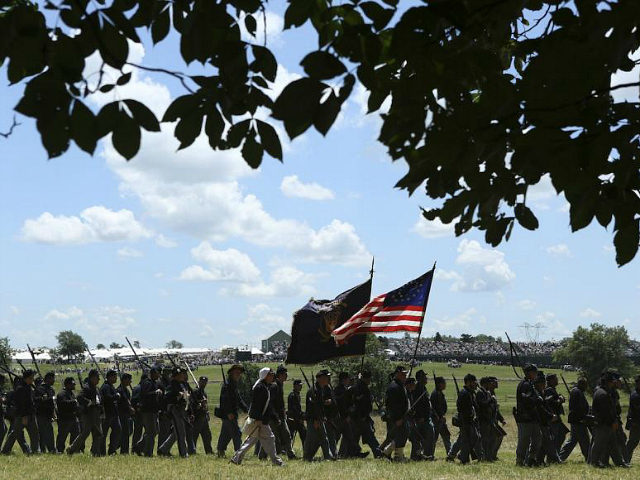Author Rod Gragg, whose books include By the Hand of Providence: How Faith Shaped the American Revolution; Forged in Faith: How Faith Shaped the Birth of the Nation; and Eyewitness Gettysburg: The Civil War’s Greatest Battle, joined Friday morning’s Breitbart News Daily with SiriusXM host Stephen K. Bannon to talk about the enduring significance of Gettysburg and how the battle has become indelibly associated with the Fourth of July holiday.
“It’s 153 years ago this weekend. Gettysburg was the greatest battle ever fought in the Western Hemisphere, North America,” said Gragg. “It’s three days, July 1 through 3, 1863, at this little crossroads hamlet in southern Pennsylvania.”
“It was arguably the decisive battle of the Civil War, in that it really turned the tide, over those three days. It was an attempt by the great military genius of the war, Robert E. Lee, to take the war to the North, after the South was really reeling with a series of northern invasions over the previous two years,” he said.
“The Southern drive for nationhood, the Confederate States of America, really had been kept alive by Lee and his Army of Northern Virginia in the field, over the course of the previous year,” Gragg recalled:
Lee had defeated one Northern general after another, in the eastern theater — George Meade, John Pope, Ambrose Burnside, Joseph Hooker — and he believed that the only way this bloodshed was going to be brought to an end, this most horrible of American wars, and southern nationhood achieved, was to defeat a major Northern army on Northern soil.
The battle of Gettysburg was Lee’s second attempt at securing such a pivotal victory, and it began promisingly enough for the Confederate forces, with battlefield successes on the first day that made their strategic goals seem within reach.
“On the second day, he failed to break the Northern line in assaults on both sides, and on the third day, in the Pickett-Pettigrew charge, he failed to break the Northern line at the center,” said Gragg:
The forces under George Meade held, and turned back Lee’s army at Gettysburg, and his invasion. That really was the high tide of the Confederacy. Never again would a Southern army, including Lee’s, have the ability to take the offensive like that. The war would last two more years, but from that point onward, the South — already losing in the western theater — was on the defensive in the East.
“Gettysburg really was the decisive battle of the American Civil War, by most measures,” Gragg said.
He highly recommended visiting Gettysburg and touring the site by following its battles in chronological order. “It is a remarkable battlefield,” he said. “It is huge, with a variety of terrain. A great deal of it appears much as it did at the time of the Civil War, at the time of the battle.”
Gragg said his book, Eyewitness Gettysburg, is a collection of first-hand accounts from both the survivors and the fallen of Gettysburg, “from Robert E. Lee’s after-action reports, and George Meade’s, to a note that a soldier pinned to his uniform to identify his body — he was killed in battle.”
He said that telling the story through “the words of the people who were there” is “the most powerful kind of history that you can have.”
Breitbart News Daily airs on SiriusXM Patriot 125 weekdays from 6:00 a.m. to 9:00 a.m. Eastern.
LISTEN:

COMMENTS
Please let us know if you're having issues with commenting.